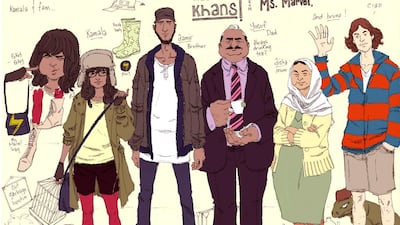The Seattle-based author G Willow Wilson made history yesterday when her new comic-book series, Ms Marvel, became the first mainstream Muslim character to be the star of her own title.
Wilson, 31, made her name writing two acclaimed graphic novels, a memoir about her own conversion to Islam and an award-winning novel, Alif the Unseen. Her latest creation, Kamala Khan, is a Pakistani-American teenager from New Jersey who discovers she can shape-shift. When she's not grappling with super-villains or making sardonic quips, she's dealing with her family and their concerns. Online buzz about the title is at fever pitch.
Do you ever tire of talking about Islam?
Any time there’s under-representation of a particular group in popular media, whatever exists is going to be subject to an excessive amount of attention and scrutiny. I get that. Unfortunately, even in this day and age, any minority character is asked to sort of justify its existence in some way.
Is diversity in comics getting better?
In the past few years, the conversation about representation has really gotten a lot more sophisticated. If you go back to the late 1990s, it was sort of a taboo to talk about racism or sexism. They were supposed to be things that we already fixed and if you brought it up you were just being whiny.
Does her experience as a Pakistani-American come into the story?
Like a lot of second-generation children of immigrant families, she very much feels a push-pull between two worlds. She grew up in the United States, but at the same time she’s proud of her heritage and wants to make her family proud. Those two sides of herself don’t always mesh neatly and she has to make difficult choices.
Is there a metaphorical aspect to her ability to shape-shift?
Shape-shifters are most often cast as bad guys and I think it reflects something telling about our society. We are very suspicious of people with multiple pieces to their identity. We really want to put people in neat little boxes and we become hostile to people who don’t fit into those boxes.
Have you received any negative responses?
There are the usual suspects who see every Muslim character in western media as a sort of stealth jihad. There’s the occasional disgruntled fan boy who says: “Why do we need all of this PC stuff?” And we’ve got a certain amount of backlash from very conservative Muslims who say a Muslim girl really has no business being a superhero. The extremes are always going to be upset with the middle.
Islamic themes recur in your work. Will you continue to explore them?
It’s interesting to me because it’s so untapped. Western conventions, especially in fantasy, have remained pretty rote for decades and the fact that there is so little written about Islamic mythology in western fantasy literature makes it appealing. But I want to do other things as well. The future is an open field.

